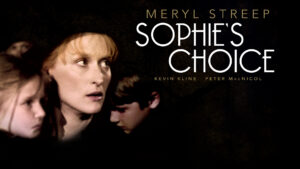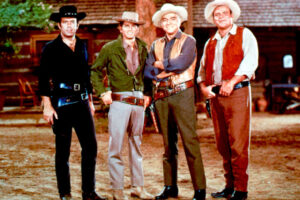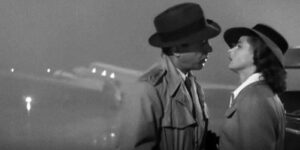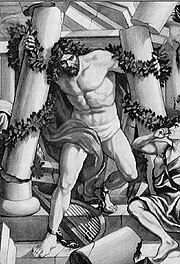by James Scott Bell
@jamesscottbell
 In his famous (or infamous, depending on your point of view) monologue at the 2020 Golden Globes, Ricky Gervais said:
In his famous (or infamous, depending on your point of view) monologue at the 2020 Golden Globes, Ricky Gervais said:
Seriously, most films are awful. Lazy. Remakes, sequels. I’ve heard a rumor there might be a sequel to Sophie’s Choice. I mean, that would be Meryl just going, “Well, it’s gotta be this one then.”
At least Meryl, in the audience cracked a smile…before shaking her head. Me, I was reminded of how the novel William Styron novel tore my guts out. I could not see the movie. Even years later, I still remember the agony I felt reading that book
Such is the power of dilemma in fiction.
A dilemma is a choice between two incompatible and dreadful outcomes. Thus, it tests a character to the limit.
Just the other day I was leisurely watching an episode of Bonanza (Baby Boomers are now humming the opening theme in their heads). For you youngsters, Bonanza was set in the 1860s, and focused on the family Cartwright. Patriarch Ben Cartwright (Lorne Greene) owned a huge spread next to Lake Tahoe, the Ponderosa, along with his sons, Adam (Pernell Roberts), Hoss (Dan Blocker) and “Little Joe” (Michael Landon).

Ben was a paragon of virtue, and in this episode he had been made a judge in Virginia City. An old safecracker Ben knows, Sundown Davis (Tom Tully), cleaned out the Virginia City bank, then turned himself in to Ben. He said he hid the money and promised to give it back if Ben will make sure he goes free.
The townspeople are desperate without their funds. Some won’t be able to feed their families. A big mining company will have to lay off workers.
Ben, however, sees that the law requires a four-time loser like Sundown to be sentenced to a mandatory prison term of twenty years.
Thus, the dilemma. Shall Ben side with the town and all of his friends? Or with his duty to the law?
The bank president sums it up to Ben. “If Sundown goes to prison, this town goes broke.”
The pressure mounts, as citizens press their case to a man they trust.
When the time comes to sentence the prisoner Ben, in his judicial robe, faces the crowded courtroom and explains that what the town is going through is a problem of the moment, but the law is for all time.
He sentences Sundown to twenty years.
The town is in an uproar. Ben becomes a pariah.
But it turns out that Sundown did not rob the bank after all. It was his son-in-law. Sundown took the rap hoping to protect his expectant daughter and her husband. He figured Ben would let him go so the town could survive.
When Ben didn’t do what was planned, the son-in-law starts to crack. His wife tells him he must do the right thing (a dilemma of his own!) He finally breaks down and gives the money back. Ben can now apply leniency so the son-in-law gets out of prison in a few years. He can rejoin his wife and soon-to-be child. And Sundown will be free to enjoy his grandchildren.
Ben’s staunch decision cost him at the time. That’s what a dilemma forces. But then there is a reversal of sorts.
Thus the structure of dilemma: choice, sacrifice, reward.
Sacrifice
The only way out of a dilemma is sacrifice. The hero will be wounded, sometimes fatally, for the choice that has to be made.
That is the power in Casablanca.
Here’s the dilemma. Rick Blaine can have the thing he wants most in the world, Ilsa Lund. She has told Rick she will go with him on the plane to Lisbon, by way of the two Letters of Transit in Rick’s possession.
The other choice is to put Ilsa on the plane with her husband, Victor Laszlo. That means Rick’s certain death at the hands of the Nazis.
 The latter choice is the only moral one. Rick would not just be taking another man’s wife, he would be hurting the war effort by sending a spear through Laszlo’s heart.
The latter choice is the only moral one. Rick would not just be taking another man’s wife, he would be hurting the war effort by sending a spear through Laszlo’s heart.
“You’re part of his work, the thing that keeps him going,” Rick says to Ilsa at the airport.
Rick sacrifices his own happiness and, he understands, his life.
Dilemma is also the power in Shane, my favorite movie.
A mysterious gunfighter is seeking a place of peace to live out the rest of his life, and seemingly finds it with a homesteading family, the Starretts.
But the cattlemen, led by Rufe Ryker, are determined to drive the homesteaders away though violence, intimidation and, if need be, death. When Joe Starrett determines to resist, Ryker hires a gunfighter, Jack Wilson (played by the inimitable Jack Palance) to do some killing.
Shane now has a choice. Go back to his gunfighting ways or move on. Ryker tells Shane he has no quarrel with him, and he can ride out of the valley with “no hard feelings.”
But doing so means the death of Joe Starrett.
**Spoiler alert. If you haven’t seen the movie, watch it ASAP, on a big screen TV**
Shane rides to town for a final showdown with Wilson.
I love this scene. Here’s the clip:
What we find out immediately afterward is that Shane is bleeding, wounded in the side (Biblical quiz: Who else was wounded in the side on behalf of others?)
Outside the saloon, little Joey Starrett sees the wound, and begs Shane to stay.
“A man has to be what he is, Joey.” Shane says. “You can’t break the mold…Now you run on home to your mother, and tell her…tell her everything’s all right and there aren’t any more guns in the valley.”
And he rides off, with Joey shouting, “Shane! Come back!”
What many people miss is the subtle visual after this. Shane’s horse takes him through a graveyard. Shane’s arms are hanging at his sides. Because Shane is dead. (Biblical quiz redux.)
Reward
The hero has the wound, is either dead or alive, but receives a just reward for his moral choice.
Hero Dies
Shane’s sacrifice brings peace to the valley. His memory is carried forward by the boy, Joey, who will grow up “strong and straight” as Shane told him.
Braveheart, William Wallace, has refused to confess, and as he’s disemboweled shouts his final word, “Freedom!” His sacrifice inspires the Scots, under Robert the Bruce, to fight a final battle that wins their independence.
 Samson kills himself kills himself three thousand Philistines by bringing down their temple. He becomes a heroic example for the Israelites.
Samson kills himself kills himself three thousand Philistines by bringing down their temple. He becomes a heroic example for the Israelites.
The Hero Lives
In Casablanca, Rick shoots and kills Major Strasser, the Nazi, in front of the French police captain, Louis, just as a cohort of French police arrives.
Louis tells them, “Round up the usual suspects.”
As the two of them walk off together to join the war effort, Rick has his reward. “Louis, I think this is the beginning of a beautiful friendship.”
At some point in your writing, think about a dilemma. What two choices can you give your hero, both of which carry a cost?
- An immoral choice that would cost the hero spiritually.
- A moral choice that would cost the hero (potentially or actually) his life.
- What reward can the hero receive as a result of the moral choice?
There is perhaps no more powerful trope in fiction than the dilemma. It can raise a cracking good read into one that is unforgettable.
Comments welcome. I’ll be in and out today, and will respond when I can.
